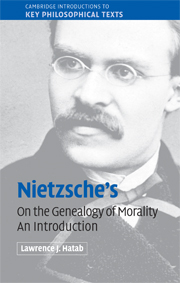Book contents
6 - Reflections on the Genealogy
Published online by Cambridge University Press: 05 June 2012
Summary
In this investigation I have tried to offer a close reading of Nietzsche's Genealogy that can give readers a sense of the remarkable complexity and range of the book. Now I would like to step back and examine a number of background issues in more detail, which can enhance an understanding of the text. These reflections will prepare the final two chapters, which aim to track how Nietzsche's analysis compares with familiar moral and political theories. Implicit in my commentary has been an attempt to appreciate the philosophical import of Nietzsche's work. But assessing its merits requires some further historical discussions and an engagement with alternative approaches to the issues at hand. In getting started, a summary sketch of the Genealogy would help. I will not present a compressed run-through of the book's main elements, but rather a broad scan of the overall philosophical strategy animating Nietzsche's historical treatment of the Western moral and philosophical tradition; such a scan can help set the stage for the discussions to come.
AN OVERVIEW OF THE GENEALOGY
I have maintained that the fundamental question underlying the Genealogy is: Can there be meaning and value in natural life following the death of God? The eclipse of the supernatural in modern thought is a presumed turn to nature, but Nietzsche insists that this turn is in fact a looping reliance on the theological tradition, and that the eclipse of God forces a more radical naturalistic challenge: If the Western tradition in one way or another is beholden to a nature-transcending or life-averse condition, then the loss of this condition's divine logo and warrant undermines traditional sources of meaning and value, to the point where the West faces the choice between nihilism and a new, affirmative philosophy of nature.
- Type
- Chapter
- Information
- Nietzsche's 'On the Genealogy of Morality'An Introduction, pp. 172 - 203Publisher: Cambridge University PressPrint publication year: 2008



